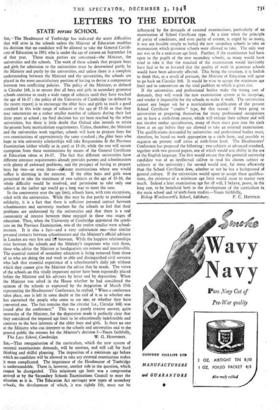LETTERS TO THE EDITOR STATE versus SCHOOL Sus, — The Headmaster of
Tonbridge has indicated the acute difficulties that will arise in the schools unless the Minister of Education modifies his decision that no candidate will be allowed to take the General Certifi- cate-of Education in 1951 who is under the age of sixteen on September 1st of that year. Three main parties are concerned—the Minister, the universities and the schools. The work of those schools that prepare boys and girls for admission ta the universities must be determined partly by the Minister and partly by the universities, and unless there is a complete understanding between the Minister and the universities, the schools are placed in the most unsatisfactory position of having to devise a compromise between two conflicting policies. The policy of the Minister, as defined in Circular 168, is to ensure that all boys and girls in secondary grammar schools continue to study a wide range of subjects until they have reached the age of 16-17; the policy of the University of Cambridge (as defined in the recent report) is to encourage the abler boys and girls to reach a good standard in this wide range of subjects at the age of15-16 so that they may concentrate on a rather smaller number of subjects during their last three years at school ; no final decision has yet been reached by the other universities, but there is little doubt that Oxford also intends to retain the present basic matriculation requirements. Unless, therefore, the Minister and the universities work together, schools will have to prepare boys for two examinations of approximately the same standard ; the 2bler boys who hope to win university scholarships will take Responsiiins ar the Previous Examination (either wholly or in part) at 15-16, while the rest will secure exemption from these examinations by means of the General Certificate of Education taken at 16-17. The fact that different universities have different entrance requirements already provides parents and schoolmasters with plenty of awkward problems, and the prospect of having to prepare boys for two—or even three—different examinations where one would suffice is alarming in the extreme. If the abler boys and girls were • permitted to take the maximum of two subjects at the age of 15-16, the whole difficulty would be resolved, and permission to take only one subject at the earlier age would go a. long way to meet the case.
In the controversy over the age limit, schools have, with rare exceptions, sided with the universities. While this may be due partly to professional solidarity, it is a fact that there is sufficient personal contact between schoolmasters and university teachers for the schools to feel that their problems are understood by the universities and that there is a real community of interest between those engaged in these two stages of education. Thus, when the University of Cambridge appointed the syndi- cate on the Previous Examination two of the twelve syndics were school- masters. It is also a fact—and a very unfortunate one—that similar personal contacts between schoolmasters and the Minister's official advisers in London are very few and fit between. While the happiest relationships exist between the schools and the Ministry's inspectors who visit them, those who advise the Minister at headquarters are remote and inaccessible. The essential control of secondary education is being-removed from those of us who are doing the real work to able and distinguished civil servants who lack that essential experience of a schoolmaster's daily job without which they cannot give the Minister the advice that he needs. The views of the schools on this vitally important matter have been repeatedly placed before the Minister and his advisers by letter and by deputation. When the Minister was asked in the House whether he had considered the opinion of the schools as expressed by the deputation of March 15th representing the Headmasters' Conference, he replied, "When a conference takes place, one its left in some doubt at the end of it as to whether one has converted the people who come to see one, or whether they have converted one. The fact remains that the circular (i.e., Circular 168) was issued after the conference." This was a purely evasive answer, quite unworthy of the Minister, for the deputation made it perfectly clear that they considered the imposed age limit to be educationally indefensible and contrary to the best interests of the abler boys and girls. Is there no one at the Ministry who can interpret to the schools and universities and to the general public the reasons for the Minister's decision ?—Yours faithfully,


































 Previous page
Previous page